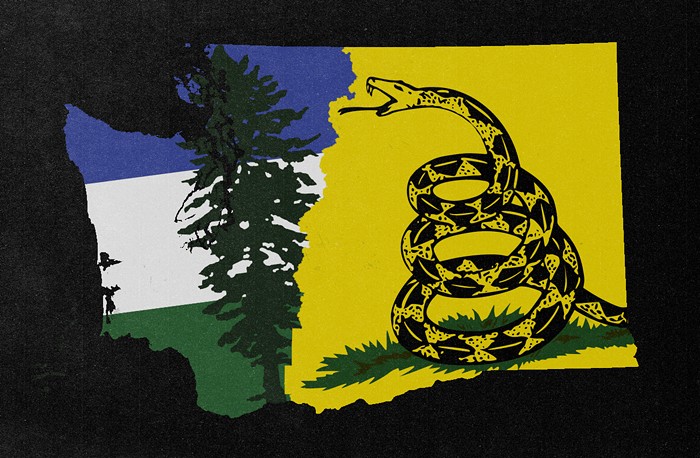
Marianne Williamson has plenty of fans—mostly, I'm guessing, members of Oprah's Book Club—but the Jong women do not seem to be among them.
On August 30, the columnist Molly Jong-Fast wrote an article for the Independent entitled "Tulsi and Marianne Need to Face Facts: No One Wants Them at the Next Debate." It was a kind of snarky semi analysis of Tusli Gabbard and Marianne Williamson, who Jong-Fast refers to, respectively, as a "Russian asset" and a "voodoo-witch anti-vaxxer."
While I disagree with the premise that no one wants these women in the debates (I do; they're entertaining) the piece was much like dozens of others that have been written since Williamson debuted at the first round of Democratic debates (a couple of which I've written myself): dismissive of her campaign, which should not exist in the first place. The woman might be a spiritual leader but that makes her about as a fit to run the country as, say, a reality TV star. Her campaign has certainly been amusing, but it’s also a massive waste of time when there are so many qualified candidates running and when the person to beat is uniquely dangerous to the republic.
Jong-Fast posted her piece on Twitter, at which point her mom, the famed author Erica Jong, replied to her daughter. "They're both weird," she wrote, which is hard to argue with, especially in the case of Williamson, who, in a now deleted tweet, urged people to use the power of prayer and visualization to turn Hurricane Dorian from its path.
This should have been the end of it—a daughter writes an article and her mom responds—but then, on Thursday, Jong-Fast posted photos to Twitter of several direct messages that Williamson apparently sent her mom, accompanied with the text: "So Marianne Williamson DMed my mom to complain about me and I have receipts."
So Marianne Williamson DMed my mom to complain about me and I have receipts. pic.twitter.com/V2iGO2Ny7H
— Molly Jong-Fast (@MollyJongFast) September 5, 2019
This tweet quickly started to gain traction (it has, as of this moment, over 17,000 likes), and, as tends to happen in this day and age, the media (myself included) sensed an opportunity to create content.
Mediaite broke this story first with the headline, "Marianne Williamson Privately Messages Erica Jong to Complain About Mean Tweet From Her Adult Daughter." Then the Hill got in on it, and then New York Magazine (which erroneously interpreted Erica's "weird" comment to Williamson’s tweet about thwarting the hurricane, which actually came several days later). And then Jezebel, which went with headline, "Unwrapping the Beef: A Very Brief History of Marianne Williamson Fighting With Erica Jong." That piece, by Ashley Reese, begins:
Marianne Williamson is a presidential candidate who believes in the power of prayer, meditation, visualization, and.... tattling to your mother if you write something mean about her. According to writer Molly Jong-Fast, Williamson sent Twitter direct messages to Jong-Fast’s mother, feminist author Erica Jong, to complain about her after she published an article in which she referred to Williamson (and Tulsi Gabbard) as “extreme, low-polling voices” in the Democratic primary.
It was all very entertaining. Who doesn’t like to make fun of the paperback oracle running for President? But here's the problem: It also wasn't true, which should have been clear to anyone who actually read the messages Williamson sent to Erica Jong. Yes, Molly said that Williamson DMed her mom to complain about her, but Williamson's messages weren't really about Molly at all. Williamson wrote:
“Sorry to see you’d call me ‘weird,’ Erica. I understand your daughter is young and doesn’t know better but given your own career and the fact that we’ve met, I would have thought you’d at least be open to a non-corporate political voice in the mix. Hope you're well!"
Erica replied: "Hope you are well too! I do believe in love & empathy as you do! But can we communicate to non-readers who are determined to pursue hatred? I am concerned about the haters & how to reach them!! I would love to be proven wrong."
Williamson responded with some shit about third-party voters and consciousness-raising and radical truth-telling (you can read the rest of the messages here and here) and she ended with this: "You're a woman who has never lived inside the box. You knew the box was toxic and stale and you ignited energy outside the box. That's why I've always related to you, Erica. We're very similar in that way. Nothing weird, just deliciously wild."
First off, "deliciously wild" would make a fantastic campaign slogan. Second, Molly Jong-Fast, who Williamson dismissed as young, is 41. But still, it's very apparent from the messages that it wasn't Molly she was complaining about to Erica; it was Erica she was complaining about to Erica. In other words, she took issue with someone's behavior and then went directly to that person to talk about it. That's how we should all be acting both online and off, but the incident was spun by multiple media sources as Williamson tattling to Molly's mom about her piece. It's almost like these reporters didn't bother to read the messages Williamson sent.
Now, I do find it weird (sorry, Marianne) that a presidential candidate would find that particular insult so galling. "Weird" is a very minor slight, especially on the internet. But Erica Jong isn't just some random mom. She's Erica Jong, a feminist icon who has sold tens of millions of books and has made a career out of writing specifically for women—much like Marianne Williamson. And although Jong, according to her daughter, doesn't remember it, the women have apparently met. This was much less like tattling to someone's mom (or, a trend as of late, their employer) and much more like an attempted heart-to-heart with an acquaintance who has, rightfully or not, caused offense. There's nothing weird, or even embarrassing, about that.
Jong-Fast, it turns out, kind of agrees with me. "I think the idea of going to people and talking to them is always good,” she told me in a phone call. “I have a lot of issues with her because we're in such a scary time, but if we weren't, I would not have touched this thing with a 10-foot pole. It makes me look petty, and there's an argument to be made that I am, but we should be spending time talking about Bernie and Liz Warren and health plans and winning the six states that are going to decide this whole election."
On that, we're in close agreement: Marianne Williamson does not belong in this race. And while I do think Molly misconstrued what actually happened between Williamson and her mom when she wrote that the candidate "DMed my mom to complain about me," I'm less concerned with Molly's tweet than I am with all the media outlets who credulously reported it.
Trust in the media is exceedingly low right now. A 2018 poll by the Knight Foundation found that nearly 70 percent of adults in the U.S. say that their trust in the news media has decreased in the past 10 years. Republicans are far more likely to distrust the media than Democrats—maybe because the President they elected likes to distract people from his incompetence and corruption by screaming about "fake news"—but declining trust in the media is a serious problem. When people stop trusting the media, our common understanding of what is true and what is not dissolves, which allows charlatans and demagogues like Donald Trump to step in and disseminate his own fucked up, self-serving version of the truth.
This, in the scheme of things, is a minor story that will probably evaporate before the workday is over (only to be replaced by something even dumber). But it's also telling because when seemingly reputable media outlets cannot even get stories like this right—when the proof is right there in the tweet—it's not hard to see why so many people are losing that sense of trust, and the consequences of this will damage far more than just Marianne Williamson’s chance of becoming the President.















